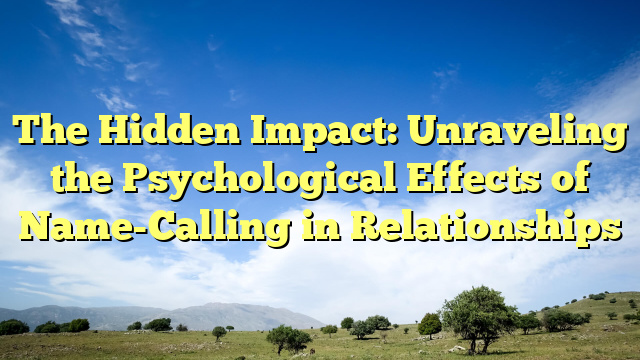The Hidden Impact: Unraveling the Psychological Effects of Name-Calling in Relationships
The Hidden Impact: Unraveling the Psychological Effects of Name-Calling in Relationships
Introduction
When it comes to relationships, communication plays a vital role in maintaining a healthy and harmonious bond. However, certain negative communication patterns, such as name-calling, can have a profound impact on the psychological well-being of individuals involved. In this article, we will delve into the hidden impact of name-calling in relationships and explore its psychological effects.
The Power of Words
Words have the power to shape our reality and influence our emotions. In the context of relationships, the words we choose to use can either build or destroy the foundation of trust and respect. Name-calling, a form of verbal abuse, falls into the latter category.
When one partner resorts to name-calling during conflicts or arguments, it can leave lasting scars on the other person’s self-esteem and mental health. The impact of name-calling goes beyond the immediate emotional distress it causes; it can lead to long-term psychological consequences.
The Psychological Effects of Name-Calling
1. Low Self-Esteem: Name-calling chips away at an individual’s self-worth. Constantly being called derogatory names can make someone believe that they are unworthy of love and respect. Over time, this can lead to a significant decline in self-esteem.
2. Emotional Distress: Name-calling triggers intense negative emotions, such as anger, sadness, and shame. These emotions can linger long after the incident, causing emotional distress and affecting overall mental well-being.
3. Anxiety and Depression: The constant barrage of hurtful words can contribute to the development of anxiety and depression. Individuals who experience name-calling in their relationships are more likely to experience symptoms of these mental health disorders.
4. Trust Issues: Name-calling erodes trust between partners. It creates an environment of fear and insecurity, making it difficult for the victim to trust their partner’s intentions and words. This can lead to a breakdown in communication and further damage the relationship.
Breaking the Cycle
Recognizing and addressing name-calling in relationships is crucial for breaking the cycle of abuse and fostering a healthier dynamic. Here are some steps to take:
- Self-Reflection: Both partners should engage in self-reflection to understand their own communication patterns and the impact of their words on their partner.
- Open Communication: Create a safe space for open and honest communication. Encourage each other to express feelings and concerns without resorting to name-calling.
- Seek Professional Help: If name-calling persists despite efforts to address it, seeking the assistance of a couples therapist or counselor can provide guidance and support in navigating the issue.
- Establish Boundaries: Set clear boundaries regarding acceptable communication within the relationship. Respect each other’s boundaries and hold each other accountable.
- Practice Empathy and Understanding: Cultivate empathy and understanding towards your partner’s feelings and experiences. This can help foster a more compassionate and respectful environment.
The Importance of Healthy Communication
Healthy communication is the cornerstone of any successful relationship. By replacing name-calling with constructive communication, couples can build a stronger foundation of trust, respect, and emotional well-being.
Here are some tips for fostering healthy communication:
- Active Listening: Practice active listening by giving your full attention to your partner and validating their feelings.
- Use “I” Statements: Instead of blaming or accusing, use “I” statements to express your own feelings and needs.
- Take Breaks: If conflicts escalate, take breaks to cool down and gather your thoughts before continuing the conversation.
- Express Appreciation: Regularly express appreciation for your partner and their efforts in the relationship.
- Seek Compromise: Work together to find mutually beneficial solutions and compromises.
Conclusion
Name-calling in relationships has a hidden impact on the psychological well-being of individuals involved. It can lead to low self-esteem, emotional distress, anxiety, depression, and trust issues. Breaking the cycle of name-calling requires self-reflection, open communication, seeking professional help if needed, establishing boundaries, and practicing empathy. By fostering healthy communication, couples can build a stronger and more fulfilling relationship.

